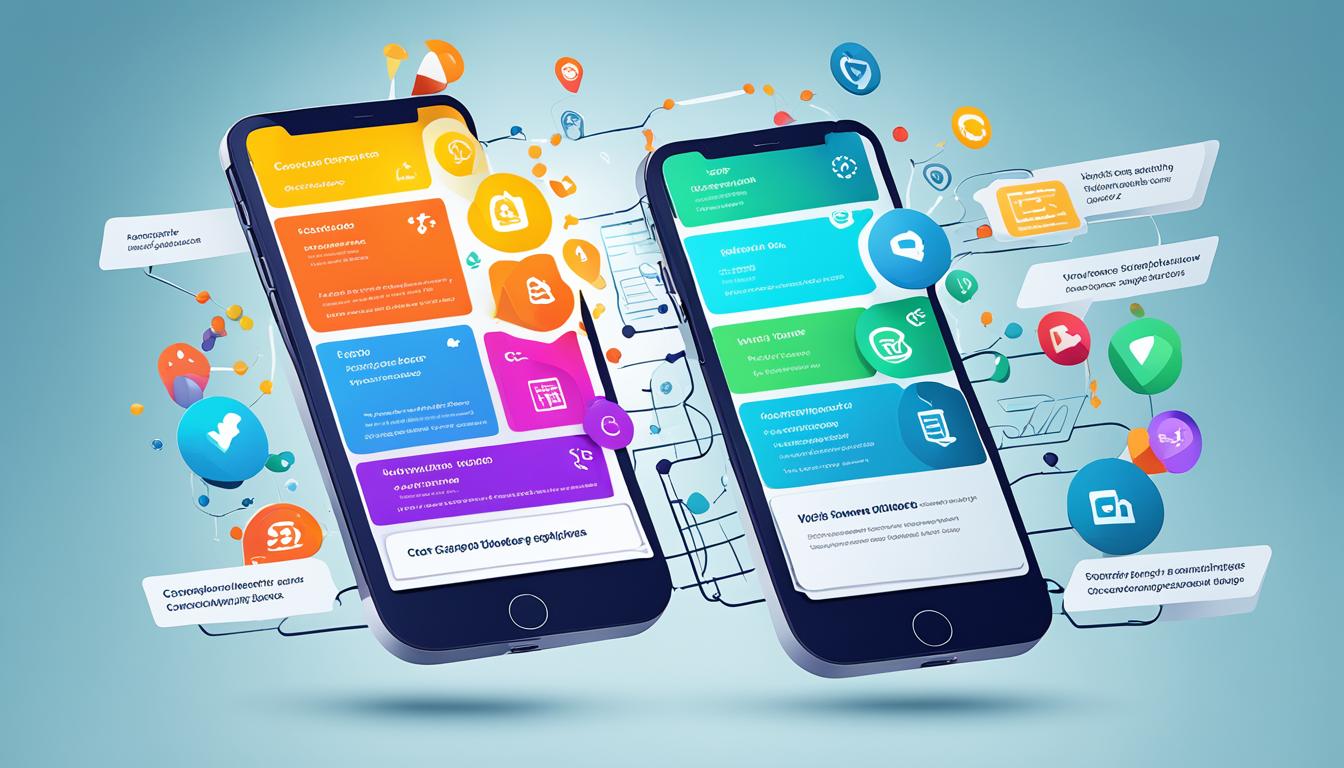In the fast-paced world of mobile apps, a new method is gaining ground. It’s called hybrid mobile app development. This method is changing how apps are made and released. It brings many benefits, like saving money and working on different platforms.
Hybrid apps use one code for both iOS and Android. This means businesses can reach more people without spending a lot on making separate apps. Using this method, companies can make apps faster and cheaper.
Table of Contents
Key Takeaways
- Hybrid mobile app development offers a cost-effective solution for businesses and developers.
- Cross-platform compatibility enables a wider audience reach across multiple mobile platforms.
- Streamlined development and faster time-to-market are key benefits of the hybrid approach.
- Enhanced user experience and seamless integration with native device features are hallmarks of hybrid apps.
- Hybrid apps provide a scalable and future-proof solution for businesses in the mobile app market.
What is Hybrid Mobile App Development?
Hybrid mobile app development combines the strengths of native and web apps. It lets developers make apps that work well on both iOS and Android with just one set of code. This code is written in HTML, CSS, and JavaScript. The aim is to get the perks of native apps and the ease of web apps.
Definition and Overview
Hybrid mobile app development is a way to mix native and web apps. It helps developers make apps that run smoothly on different platforms. These apps have the look and feel of native apps but also use web tech for easier development and wider compatibility.
Understanding the Hybrid Approach
This method blends web and native tech. Developers use frameworks like Ionic, React Native, or Cordova to build the app’s interface and main features. This makes building apps faster and lets them run on many platforms. Hybrid apps also use native features and APIs for a better user experience.
| Native Apps | Hybrid Apps |
|---|---|
| Developed specifically for a single platform (iOS or Android) | Can be deployed on multiple platforms (iOS, Android, and more) with a single codebase |
| Offer superior performance and access to device features | Combine the benefits of native apps and web-based technologies |
| Require separate development for each platform | Allow for a more efficient and cost-effective development process |
Hybrid app development is becoming more popular. It offers a good mix of native and web tech benefits. This approach lets businesses and developers make apps that work well for many users on various platforms.
Cost-Effectiveness: The Compelling Advantage
Hybrid app development is a big win for saving money. It uses one code for many platforms, cutting down on time and resources. This means big savings for businesses. It also means no need for different codes for each operating system, making it more efficient and cost-saving.
Compared to making native apps for iOS and Android, hybrid apps save money in several ways:
- Developers only write the code once for many platforms.
- Updates and bug fixes are easier and cheaper because of the single codebase.
- The development process is quicker and more efficient.
- Web technologies used in hybrid apps are often cheaper than native app development.
Choosing hybrid app development helps businesses save money and boost their return on investment (ROI) over time.
“Hybrid mobile app development is a game-changer in the world of cost-effective app creation, offering businesses a remarkable opportunity to reduce expenses while delivering exceptional user experiences across multiple platforms.”
Cross-Platform Compatibility and Reach
Hybrid mobile app development has a big plus when it comes to working on different platforms. It lets businesses make one app that works on many operating systems. This means more people can use the app, making it easier for companies to reach more customers. Not having to make separate apps for iOS and Android is a big win.
Being able to make cross-platform mobile app solutions is a big deal for businesses. It helps them reach more customers and grow their app’s audience. This leads to more people using the app, which means more engagement, loyalty, and money.
Expanding Your User Base
Hybrid mobile app development lets businesses reach a wide range of users across many platforms. This means companies can attract more potential customers. No matter if users like iOS or Android, the hybrid app gives a smooth experience. It makes it easier for businesses to connect with their audience.
“Hybrid mobile app development is the key to unlocking cross-platform success and expanding your user base. It’s a game-changer for businesses looking to maximize their reach and connect with a broader audience.”
Hybrid apps are also great for adapting to new platforms and devices. When new tech comes out, companies can easily update their apps. This keeps their app relevant and lets them stay connected with their users.
Streamlined Development and Time-to-Market
Hybrid mobile app development makes building apps faster and cheaper. It uses a shared codebase to cut down on time and effort. This means apps can be made for different platforms quicker.
This method lets businesses turn their ideas into apps fast. It helps them stay ahead in the fast-changing mobile app world. Instead of making separate apps for iOS and Android, hybrid apps use one code for all platforms.
The benefits of this approach are clear:
- Faster app development cycles help businesses quickly meet market needs.
- Apps hit the market faster, keeping companies ahead of rivals.
- Development costs go down since there’s no need to do the same work twice.
Using hybrid mobile app development means faster app creation, quicker market entry, and a more efficient process. This strategy lets companies grab new chances and stay competitive in the mobile app world.
“Hybrid mobile app development has changed how we make and release mobile apps. Using a shared codebase has cut our time-to-market, letting us meet customer needs faster than ever.”
The Advantages of Hybrid Mobile App Development
Leveraging Web Technologies
Hybrid mobile app development uses web technologies to its advantage. It lets developers use their skills in HTML, CSS, and JavaScript for making mobile apps. This method is cost-effective and efficient, making apps that work on many platforms. It also expands your app’s reach and accessibility.
Using web technologies for mobile apps brings flexibility. Developers can mix web parts with native features for a better user experience. This way, they can cut down on development time and costs. Sharing the same code across different systems means less work for each platform.
Hybrid app development has more perks than just saving money and working on many platforms. It lets developers use a big library of tools and frameworks, speeding up the development and deployment of mobile apps. This helps businesses get their apps to market faster, catching new trends and opportunities.
“Hybrid mobile app development harnesses the power of web technologies to create versatile and accessible mobile experiences.”
In summary, the benefits of hybrid app development are clear. It uses web development skills for a streamlined and cost-effective way to make mobile apps. This approach lets businesses reach more users and offer great mobile experiences. It also helps in using development resources wisely and on time.
Enhanced User Experience
Hybrid mobile app development is a great way to make apps better for users. It uses both native and web technologies to make apps run smoothly and work well. This approach ensures users get the best of both worlds.
Designing hybrid apps is easy for developers. They can use the device’s features and make the app look good and work fast. At the same time, they can add web-based elements to make the app feel familiar to users.
Smooth and Intuitive Interactions
Hybrid apps are great at making things run smoothly on mobile devices. They use the device’s features to make touch gestures, animations, and graphics work better. This makes the app more enjoyable to use.
These apps also follow design rules to make things easy for users. Developers use known UI patterns and make sure the app looks good on all devices. This makes the app easy to use and consistent.
“Hybrid mobile app development allows us to deliver a truly seamless and intuitive user experience, bridging the gap between native and web-based technologies.”
Hybrid apps find a good balance between native and web features. This makes the app fun and engaging for users. It makes them want to use your app more often.
Integration with Native Features
Hybrid mobile app development shines when it comes to using native device features. By using native hardware and APIs, hybrid apps get better functionality. This makes the user experience richer and more engaging.
Hybrid apps can easily use features like the camera, GPS, and push notifications. This lets them offer advanced features that users expect in today’s apps. It makes the experience better than what web apps can do.
- Seamless access to native device camera, GPS, and push notifications for enhanced functionality
- Leveraging the power of native device hardware and APIs to create more engaging and feature-rich experiences
- Blending the best of web and native technologies to deliver native-like performance and user interactions
Developers using the hybrid approach can use the device’s full power. This opens up many possibilities for their apps. It makes the apps stand out by offering great functionality and performance.
“Hybrid mobile app development allows us to create applications that seamlessly integrate with the native features of the device, bringing the best of both worlds to our users.”
The need for apps that are rich in features and easy to use is growing. Using native features in hybrid apps is key. It lets developers make apps that really connect with their audience.
Maintenance and Updating Simplicity
Hybrid mobile app development makes updating and maintaining apps easy and efficient. It uses one codebase for all platforms. This means updates and fixes can be made at once, saving time and resources.
This method lets companies quickly make changes, add new features, and keep their apps current. With easy maintenance of hybrid mobile apps, they can give users a great experience. They don’t have to deal with the complexity of different operating systems.
Also, simplified updates for hybrid apps make managing apps more efficient. Teams can quickly adapt to changes in the market and user needs. This quick response is key in today’s fast-changing digital world.
“Hybrid app development offers a seamless way to keep our mobile application current and relevant, without the hassle of managing multiple codebases. The ease of maintenance and updating has been a game-changer for our business.”
By using hybrid mobile app development, businesses can be more efficient and responsive. This ensures their mobile apps stay valuable in the digital market.
Scalability and Future-Proofing
The hybrid method in making mobile apps has a big plus for growing and staying ahead. It uses the same code for both platforms, making it easier to add new stuff or change things as needed. This makes hybrid apps for long-term growth great for keeping up with customer needs without big updates.
Hybrid apps are great for growing and changing with your business. When new tech or user wants come along, you can update your app easily. This keeps your app fresh and competitive in the digital world. It’s key for businesses wanting to stay strong in a fast-changing market.
- Effortless Adaptation: Hybrid apps, with their shared codebase, can be easily modified and enhanced to support new features and functionalities, allowing businesses to stay ahead of the curve.
- Streamlined Maintenance: Updating and maintaining a hybrid app is typically more efficient than managing separate native codebases for multiple platforms, reducing the time and resources required for ongoing development.
- Future-Proof Architecture: The hybrid approach lays the foundation for a future-proof mobile app architecture, ensuring that the application can adapt and scale as the business and user needs evolve over time.
| Benefit | Description |
|---|---|
| Scalable hybrid mobile app development | The hybrid approach enables businesses to easily scale their mobile applications to accommodate new features and functionalities, ensuring long-term growth and adaptability. |
| Future-proof mobile app architecture | Hybrid apps are designed with a focus on flexibility and scalability, allowing the application to evolve and stay relevant in the face of changing market demands and technological advancements. |
| Hybrid apps for long-term growth | The hybrid model empowers businesses to develop mobile applications that can withstand the test of time, providing a stable and adaptable platform for sustained growth and success. |
Choosing the hybrid way for making mobile apps lets businesses use scalable hybrid mobile app development. It helps build future-proof mobile app architecture for long-term growth. Hybrid apps are flexible and can grow with your business, making them a smart pick for companies aiming for lasting success in the digital world.
Access to Device Hardware and APIs
Hybrid mobile app development lets you use device hardware and APIs. This means your app can have more features and a better user experience. It makes your app more powerful and interesting.
Hybrid apps can use the camera, GPS, and other device features. This lets them do things that were only possible in native apps. For example, they can take photos, track your location, and send push notifications.
Developers use web technologies like HTML, CSS, and JavaScript in hybrid apps. But they also get to use the device’s hardware and software. This hybrid apps accessing device hardware method makes apps look good and work well. It gives users the best of both worlds.
Using native device APIs in hybrid apps opens up many possibilities for developers. It lets them add advanced features in hybrid mobile apps. These features make the app stand out and improve the user experience.
“Hybrid mobile app development allows us to create feature-rich applications that rival the capabilities of native apps, all while leveraging the cost-effectiveness and cross-platform compatibility of the hybrid approach.”
Offline Capabilities and Performance
In today’s fast-paced mobile app world, being able to work well even without internet is key. Hybrid mobile apps mix web and native tech to give users a great experience, no matter their internet status.
The offline functionality in hybrid mobile apps is a big plus. It lets users use the app and do tasks offline. Hybrid apps use caching and smart coding to keep important data on the device. This means users get a smooth experience even when they’re not online.
This offline support, along with the hybrid app performance benefits, makes hybrid apps stand out. Developers can make apps that sync data smoothly. This means users can keep working without interruption. The app updates data when internet comes back.
This leads to a top-notch optimized hybrid app experience. It works well in places with good internet or no internet at all. This is a big deal for industries like healthcare, logistics, or emergency services where always having info is key.
“The ability to function seamlessly, even in areas with limited internet connectivity, has become a crucial consideration in the dynamic world of mobile app development.”
By using hybrid app tech, businesses make sure their apps work well everywhere. This means users stay happy, use the app more, and businesses do better.
| Feature | Benefit |
|---|---|
| Offline Functionality | Uninterrupted user experience, even in areas with limited internet connectivity |
| Caching and Optimization | Faster app performance and responsiveness, even when offline |
| Seamless Data Synchronization | Ensuring data integrity and continuity across online and offline states |
Secure and Robust Architecture
In the world of mobile app development, keeping data safe and respecting user privacy is key. Hybrid mobile apps offer a secure way to protect sensitive info and keep user data private. They use top security methods and best practices to make sure the secure hybrid mobile app architecture works well. This means better data protection in hybrid apps and keeping user privacy in hybrid mobile apps safe.
Hybrid apps are great at keeping data safe. They use secure ways to send data, encryption, and controls to stop unauthorized access. This makes users feel safe, knowing their personal info is well-protected.
Protecting Data and User Privacy
Hybrid apps put user privacy first. They follow rules and best practices to keep user info safe during use. They make sure data is stored securely and access to sensitive parts is controlled. This builds trust between the app and its users.
“Hybrid mobile app development is a game-changer in the world of mobile app security, offering a robust and secure architecture that safeguards user data and privacy.”
With more data breaches and privacy worries, hybrid apps offer a strong solution. They focus on secure hybrid mobile app architecture, data protection in hybrid apps, and user privacy in hybrid mobile apps. This makes them a top choice for businesses and users.
Developer Productivity and Collaboration
Hybrid mobile app development can greatly improve developer productivity and make collaborative workflows easier. It uses one codebase and web technologies that developers know well. This makes it easier to build and keep up mobile apps.
This approach makes it simpler for team members to work together. They can share knowledge, plan tasks, and update the code easily. Being able to reuse code and work with native device features makes the development process more efficient.
- Improved developer productivity with hybrid apps
- Enabling collaborative hybrid app development
- Fostering efficient hybrid app development workflows
| Metric | Traditional Native App Development | Hybrid App Development |
|---|---|---|
| Time-to-Market | Longer development cycles | Faster time-to-market |
| Development Costs | Higher costs due to platform-specific expertise | Lower costs with a single codebase |
| Maintenance and Updates | Requires more effort to maintain and update across platforms | Simplified maintenance and updates with a shared codebase |
Using the hybrid approach, development teams can see improved productivity, better collaboration, and smoother workflows. This leads to making mobile apps more efficiently and effectively.
“Hybrid mobile app development empowers our team to work together seamlessly, leveraging our existing web development skills to create high-performing apps for multiple platforms.”
Third-Party Integration and Ecosystem
Hybrid mobile app development lets businesses easily connect with many third-party services and tools. This wide range of integrations helps make mobile apps more useful and valuable for users.
With things like payment gateways and analytics platforms, developers can quickly add new stuff to their apps. Using third-party integrations in hybrid mobile apps, businesses can extend hybrid app capabilities and leverage the hybrid app ecosystem. This helps them stay ahead and meet what their customers need.
Extending Functionality
Adding third-party services and tools to hybrid mobile apps makes them more powerful. Developers can use a strong analytics platform to understand user behavior better. They can also add a popular social media API for better social interactions or a secure payment gateway for transactions.
By using this wide range of options, hybrid app developers can extend hybrid app capabilities. This means they can give users a better experience that keeps up with new trends and what customers want. The easy integration and flexibility of hybrid apps make them a top choice for businesses wanting to stay competitive.
| Third-Party Integration | Benefit |
|---|---|
| Payment Gateways | Secure and seamless in-app transactions |
| Analytics Platforms | Comprehensive user behavior insights |
| Social Media APIs | Integrated social features and interactions |
Conclusion
The benefits of hybrid mobile app development are clear. It’s cost-effective and works on many platforms. It also makes development faster and improves the user experience.
Hybrid apps use web tech and blend with native features. This lets companies make apps that are top quality, versatile, and affordable. They can reach more people and meet customer needs better.
Hybrid apps also work offline, are secure, and can grow with your business. This makes them a smart choice for the changing mobile world.
The key benefits of hybrid apps show why many companies pick this method. They want to succeed in the mobile market and give users great experiences.














